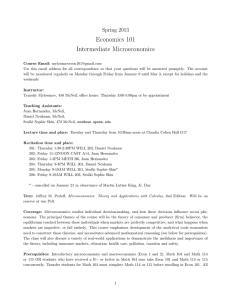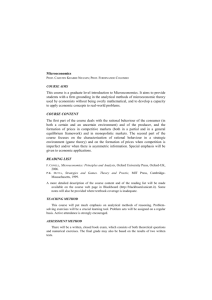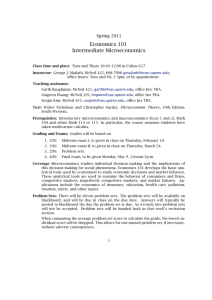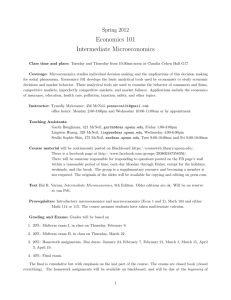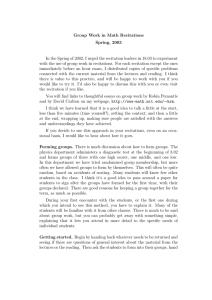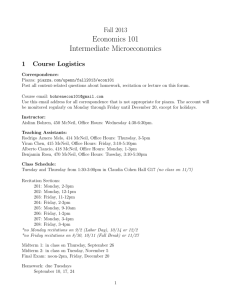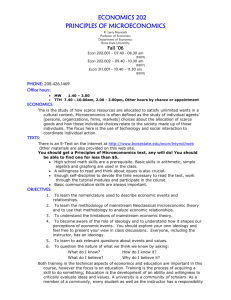Economics 101 Intermediate Microeconomics
advertisement
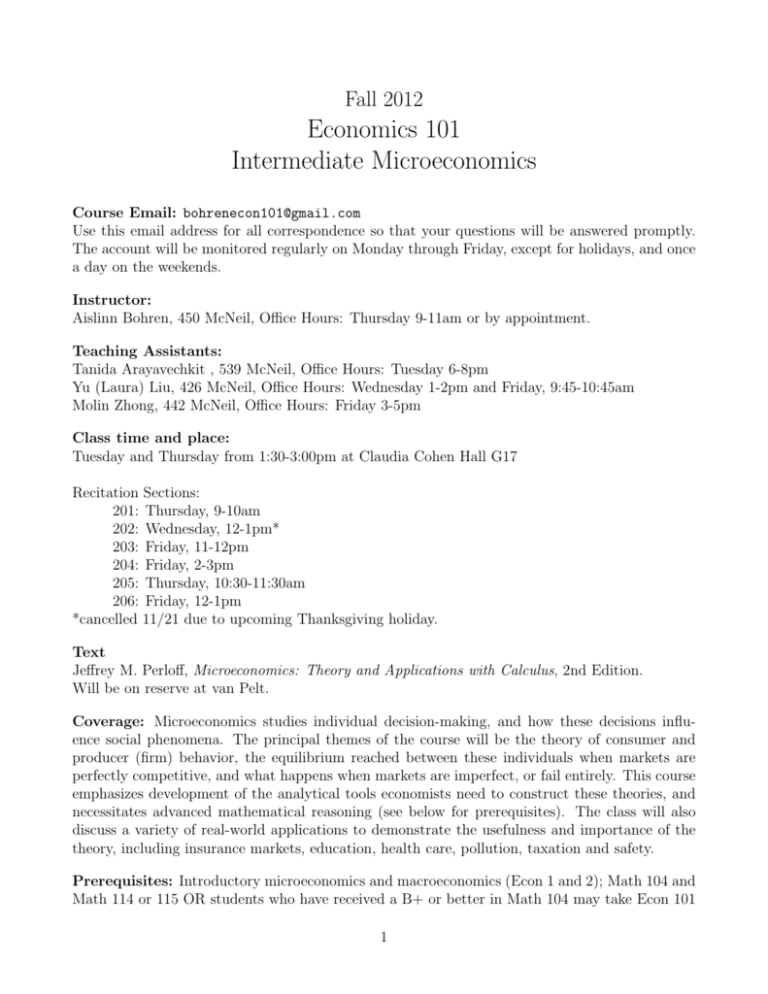
Fall 2012 Economics 101 Intermediate Microeconomics Course Email: bohrenecon101@gmail.com Use this email address for all correspondence so that your questions will be answered promptly. The account will be monitored regularly on Monday through Friday, except for holidays, and once a day on the weekends. Instructor: Aislinn Bohren, 450 McNeil, Office Hours: Thursday 9-11am or by appointment. Teaching Assistants: Tanida Arayavechkit , 539 McNeil, Office Hours: Tuesday 6-8pm Yu (Laura) Liu, 426 McNeil, Office Hours: Wednesday 1-2pm and Friday, 9:45-10:45am Molin Zhong, 442 McNeil, Office Hours: Friday 3-5pm Class time and place: Tuesday and Thursday from 1:30-3:00pm at Claudia Cohen Hall G17 Recitation Sections: 201: Thursday, 9-10am 202: Wednesday, 12-1pm* 203: Friday, 11-12pm 204: Friday, 2-3pm 205: Thursday, 10:30-11:30am 206: Friday, 12-1pm *cancelled 11/21 due to upcoming Thanksgiving holiday. Text Jeffrey M. Perloff, Microeconomics: Theory and Applications with Calculus, 2nd Edition. Will be on reserve at van Pelt. Coverage: Microeconomics studies individual decision-making, and how these decisions influence social phenomena. The principal themes of the course will be the theory of consumer and producer (firm) behavior, the equilibrium reached between these individuals when markets are perfectly competitive, and what happens when markets are imperfect, or fail entirely. This course emphasizes development of the analytical tools economists need to construct these theories, and necessitates advanced mathematical reasoning (see below for prerequisites). The class will also discuss a variety of real-world applications to demonstrate the usefulness and importance of the theory, including insurance markets, education, health care, pollution, taxation and safety. Prerequisites: Introductory microeconomics and macroeconomics (Econ 1 and 2); Math 104 and Math 114 or 115 OR students who have received a B+ or better in Math 104 may take Econ 101 1 and Math 114 or 115 concurrently. Transfer students for Math 104 must complete Math 114 or 115 before enrolling in Econ 101. All enrollment is through permission of the department. Economics 101 assumes that students have taken multivariate calculus, and a strong understanding of these mathematical tools is crucial to succeed in the course. To emphasize this point: if you are not comfortable with basic calculus, this course may be an inappropriate fit. Grading and Exams: Grades will be based on 1. 20%: Midterm Exam I, in class on Tuesday, October 2. 2. 20%: Midterm Exam II, in class on Tuesday, November 6. 3. 20%: Problem Sets, due: September 18, September 25, October 16, October 30, November 20, December 4 (all Tuesdays) 4. 40%: Final Exam, noon-2pm, Thursday, December 13. The final is cumulative but with emphasis on the last part of the course. The exams are closed book (closed everything). A study guide with a list of concepts and practice questions will be provided before each exam. The first midterm will be returned before the deadline to drop classes (October 12). Problem Sets: There will be six problem sets, available on blackboard and due at the beginning of class on the due date. The assignments can be discussed with classmates, but should be written and submitted individually. Submit as hard copies or as pdf files to bohrenecon101@gmail.com. Answers will typically be posted to blackboard the day the problem set is due. As a result, late problem sets will not be accepted. I will select a subset of two or three questions to grade on each problem set; they will be handed back in the recitation sections. Course material: All course material will be posted on Blackboard. Readings: weekly reading will be assigned to complement the lectures; this reading is required and students are responsible for understanding the material assigned. Lecture Slides: slides will be posted before each class; an updated version with annotations from lecture will be posted afterward. Recitations: sessions will be used to develop problem solving skills by presenting examples, reviewing difficult areas on past problem sets, providing hints on future problem sets and answering questions; attendance is mandatory. Forums: there is a discussion forum (titled Microeconomics Course Material) on Blackboard where you can collaborate with classmates on issues related to course material, lecture and recitations. Feel free to start a thread if you would like to post about a specific topic. One of the best ways to acquire problem solving skills is by interacting with peers to see where they are struggling, learn tricks to understand new concepts and see issues from a different perspective. This forum will also 2 help instructors to identify areas of difficulty for students and hone recitation sections to focus on these areas. Course instructors will monitor, but not post on this forum. If you have a question for an instructor, use the course email: bohrenecon101@gmail.com Please check your email settings on blackboard to make sure you receive emails. There will be a test email message sent to the class list through blackboard on Friday, September 7. Succeeding in the Course: achieving success in Econ 101 requires regular attendance at lectures and recitations, completion of the assigned readings and LOTS of practice working through examples and problems. This last point is imperative: practice is the best way to develop problem solving skills. Simply looking at the answer to a problem or following the reasoning is not sufficient; students need to attempt problems and try to work through difficulties on their own before turning to the solution. The exercises in Perloff provide an excellent supplement to problem sets and recitation examples. Frequent practice will build the skills you need to succeed on the exams. Course Policies: The Economics Department Course Policies, which include rules about exam attendance, make-up exams, grading appeals, etc., are available at: http://economics.sas.upenn.edu/undergraduate-program/course-information/guidelines/policies Laptops may be used for note-taking, but students may not use cell phones during lecture or recitations. 3
